#parallel to our own or something
Explore tagged Tumblr posts
Text
in ii s2e10 on mephone's back it says, "designed by meeple on inanimate planet, assembled in new york," but in episode 13 it says "designed by meeple on mecloud"
#wheucto#wheucto speaks#it also says inanimate planet in earlier episodes but i remarked this particular one bc it's closer and also i thought they retconned it or#something or didnt show his back idk#inanimate planet is? something that's kind of hinted towards in ii as the planet they live on?#which is? something?#like. first of all the name#WHY is it named inanimate planet?#that's a strange name#but i guess it could come from the inhabitants being objects as opposed to something else#like humans#though with mars existing probably at the same place it is in our solar system it might be that inanimate planet is /an/ earth that exists#parallel to our own or something#though the fact that it then specifies assembled in new york is? strange?#like ok it's made on another planet kinda strange but??? the fact that they list an entire planet then just some city#it could say something like 'designed by meeple on meeple cloud_ inanimate planet_ assembled in new york_ usa_ human planet'#i said human planet bc idk what else it would be#if they're both earths then it'd be weird for one to be earth even if it was our earth#and besides there was that one frenchman who pretended to be from italy_ which implies the existence of our countries on inanimate planet#which would mean that saying inanimate planet and then new york makes even less sense bc there's TWO new yorks#unless that frenchman was from the other planet#also the fact that mephone was assembled on an entirely different planet? to be shipped back or something? is like really weird#unless they have some wormhole connecting the two worlds that anyone can go through at any time#still kinda weird though why would you assemble your robot guy on another planet#anyways i don't think inanimate planet is 'canon' at least not anymore#i just wanted to ramble bc the idea is real weird to me
4 notes
·
View notes
Text




We live and die in the shadows, for those we hold close - and those we never meet.
#mission impossible#mi7#mission: impossible#ethan hunt#eugene kittridge#grace m:i#parallels#my edits#hotel california#as nancy once said what is espionage if not the hotel california of professions#something something benji saying 'we're here because we want to be' / the lyric 'we are all just prisoners here of our own device'
66 notes
·
View notes
Text
so if solas sees himself in the inquisitor because of how they were made a leader, a prophet and a symbol by people who followed them, just as fen'harel had been made a leader and a saviour for by the freed elven slaves, will he see himself in rook because they're left alone against the threat they can't possibly defeat without singlehandedly making decisions that will impact the world in unknown ways, just as fen'harel had been left alone against evanuris with no other option but to create the veil
#just a thought. because 'what will they call you when this is over' haunts me to this day#anyway i genuinely wonder which way they'll take the solas-protagonist parallel this time#because it sure did happen before! but if they do that again there must be something they can offer#for now i see this like the inquisitor reflects that part of fen'harel story where he became a hero to his people#and then. the history got it all wrong.#but rook i think. their story might reflect the later and uglier parts of fen'harel's path. the ones that made their way into these legends#and then got spiced up with evil laughter. the hard decisions solas once had to make#it's not like inky's story didn't have that kind of decisions. but i think dai didn't focused on that kind of impact that much#also the inquisitor was backed up by their inquisition; as was fen'harel by his followers once#but at the end fen'harel is also known as who he hunts alone. you get the idea#I'm just speculating here but it seems our only kind of organisation is rook's companions. and whoever agrees to help them#without directly joining them. they have a lot less power than the inquisition did#which is interesting on it's own i think#but i think it would be interesting to see solas guide someone knowing full well they won't be able to make the right decision#because there's none#dragon age#dragon age the veilguard#solas#the inquisitor#rook
108 notes
·
View notes
Text
OKAY why do yall have to have the worst nastiest most rotted bad faith interpretations of things ever the episode was incredible what the fuck is wrong with you
#you cant love something?#you've never heard of 'if you love something let it go'#????#like okay tell me you dont understand narrative structure without telling me#because the difference is they chose it! they voted! they decided!#all the other times leading up to this that alison has considered leaving it was never going to work#it was in desperation and full of schemes and tricks and barely scraping by#of course this time was different!#instead of NEEDING to sell the house. it was a choice#instead of alison leaving them it was them letting alison go.#do you GET IT!!!!!!!!!!!!!!!!!!!!!#it was actually perfect!!!!!!!!!!!#alison has always been the audience surrogate. and they made it so literal#like we are separated from the ghosts now but that doesnt mean we cant come back#that doesnt mean we cant love them#and even from the pov of the writers! you're leaving this story by choice#youre not being forced into another season or trying to scrape together every last penny#they're still there! we're just going our separate ways!#where's that art that's like. different relationships and its lines running parallel and away and intertwining#ghosts has always been about doing things in your own time and unconventional expressions of love and family and growth#i thought it was perfect okay!!!!!!!!!!#if you're mad i get it feel how you feel#but the themes stayed theming. i thought it worked perfectly#remind me to never trust when yall say things are bad#bbc ghosts#ghosts spoilers
40 notes
·
View notes
Text
lgbt people need to stop thinking in terms of black and white and by that i mean stop thinking our oppression as directly analogous to the oppression of black people by white people it's not the same !
#fuck dave chapelle hope he dies broke and alone . that being said. i think this line of thinking is the reason why black and other nonwhite#people associate transness specifically with whiteness#part of the reason why anyway. because when we're trying to make direct parallels between something that is not institutional and something#that has been for hundreds of years and is ingrained into basically every facet of culture (transphobia vs antiblackness tbc)#then youre going to have cis(het) black and nonwhite people be like oh these people have no idea what theyre talking about#it's real oppression but talk about it on its own terms...#this isn't to say the two can't intersect OFC THEY DO they do very hard and very violently#i think that we pull from black liberation politics and language in the west particularly in the usa because when we say civil rights that'#the struggle we think of . The Struggle. so we try to pull from that history and current battle. and while parallels absolutely can be#formed esp because so much of lgbt history and liberation in the west is propelled by the work of black and brown trans women..#as white lgbts we need to be able to talk about our struggle in context with that without pulling unnecessary and unapplicable takeaways#from a distinct intersectional struggle that we don't face. does that make sense.#to be clear again the reason dave chapelle thinks transness is a white construct also has to do with just plain ole transmisogyny. i'm not#placing the blame entirely or even mostly on us here that would be ridiculous
12 notes
·
View notes
Text
Been thinking about my body a lot
#Sel talks#Listened through Fat Talk by Virginia Sole-Smith which talked a lot about how bodies are tools#And the way she talked about how thin-ness shouldn't be something we strive for#And I can't help but draw parallels between my own desire to go on t? I don't know. Been having too many thoughts stewing#I keep coming back to isabeau's line of “maybe it was easier to change into someone I could love than to learn how to love how I was”#And I had drawn both hrt and diet culture back into this; but. Neither of them are from self love?#It's. Idk; a friction? On how you perceive yourself and how the world perceives you?#Or. Idk idk. It's hard to articulate now that I'm trying to get it down#If I remember right; one of the messages of fat talk was how bodies should be for function first and foremost; and should hardly-if ever-#Considered for aesthetic. And yes- trying to loose weight is one of the most damaging aesthetic changes you can do-#Idk! I feel like I'm looking too far into it#Something something you're not happy with how your body looks/is perceived so you want to change it#Whether that's influenced by society; loved ones; or something biological; it's still a desire to change your body#Although one is vastly more accepted than the other#Trying to become thin is trying to make yourself more comfortable in a vastly fatphobic world; to placate the people think they have say#Over your body; make yourself more palettable to the world around you.#Which I guess is an important distinction#Becoming the person you want to be even through everyone telling you that it's wrong or disgusting#But a part of me can't help but think a part of the reason I want to do hrt might have something to do with our male centric society?#I'm too tired to elaborate any further but I feel less busy now that I have it out
9 notes
·
View notes
Text
Imagining a scenario where at some point Dante and Lady get married purely for practical purposes (like if she gets hospitalized so Dante can visit/make some decisions) but Lady ends up dating Trish so Dante's like

#dmc#this is crack but. i find it hilarious#if we're doing a timeline that sort of parallels our own i'm also imagining dante being like#'don't worry you're free to divorce me once you and trish are allowed to be married! no hard feelings'#'hell we can make it a double divorce-marriage! we can get divorced at the courthouse and then you and trish get married right after!'#i really like lady/trish as a ship#i generally think of dante/lady as something that they might have tried out when they were younger but eventually realized they weren't-#into. and there were no hard feelins there. just a 'yeah sorry but i don't think this is going to work' and the other going 'fine by me'#a very gentle friends to maybe lovers or just dating back to friends#and in this marriage scenario it would basically fit right into canon. they wouldn't live together or anything#it would purely be a paper thing just so dante gets some special privileges in case something happens to lady#also the extended version of this is dante visiting kyrie at some point and she asks him how his wife is doing which makes him go#'wait. who is this supposed wife of mine?' bc he's pretty sure nero doesn't know about the marriage so how would kyrie know that??#and she reveals that she thought it was Trish which makes him laugh and say nah they're just friends. also Trish is dating Lady#which makes Kyrie go 'oh! i'm sorry. you two seemed close and nero mentioned seeing her at your place so i'd assumed...'#and dante's like 'eh no worries it's no big deal. i was wondering how you knew about lady and i but that makes more sense.'#then kyrie: 'wait. you and lady are married?' dante: 'yeah!' kyrie: 'but i thought you said she was dating Trish??' dante: 'she is!'#kyrie: '??? uh. well if you're happy i'm happy for you too.' dante: 'thanks! i'll let them know.'#erurandomness#erubabbles#eru hcs#hcs
6 notes
·
View notes
Text
God nothing hits like early bleach, the substitute shinigami arc and rukia’s execution arc are just. Ugh. Something about the crunchy-ass early 2000s-ness of it that the rest of the series lost (not just animation wise but aesthetic wise), when there was still hope that all the potential would be capitalized on, idk, it was just fun and getting to fall in love with all the characters because pretty much every single one introduced was great and engaging. I just really really wish the series had kept that early vibe that it started losing once the visoreds were introduced, they got the last little tail end of it. As soon as we got to the heuco mundo arc this all vanished and it’s so upsetting, the series just lost a lot of its personality, if that makes sense, I wish it had kept it so badly
#like they’re all the same characters but they all started taking themselves way too seriously after that point#and I do get that that’s when the Big Plot actually started picking up (which is a whole other thing I have thoughts on)#but like… idk the series just lost a lot of its early charm and appeal#which is funny considering the hueco mundo arc is actually my favorite one#but idk I’m watching the first arc for fun today#and I forgot how much of ASSHOLES rukia and ichigo were and how fun their dynamic was#and yeah I fucking miss it it’s just not the same the rest of the series#not to mention tatsuki actually got a lot of focus#even Chad and Orihime and uryu felt a lot more genuine than they did the rest of the series#(though that’s because it was before they were reduce to being Ichigo’s love interest and then cannon fodder to shittily power scale enemies#by getting the shit beat out of them because kubo didn’t know how else to do it)#idk like I said! I just wish the series had stuck a lot better to its earlier aesthetic#like it still could have worked with the more ‘serious’ plot lines v easily considering how well it meshed with rukia’s execution#I JUST MISS RUKIA YELLING AT FLIP PHONES AND ICHIGO BEING BAD AT SNEAKING OUT WINDOWS AND TATSUKI RAGGING ON THEM#AND THEIR NORMAL ASS CLASSMATES TALKING ABOUT HOW FUCKING WEIRD THEY ALL WERE LIKE IT WAS SO GOOD 😩😩😩#imagine that energy being applied to the hueco mundo arc it would have been great#it even would have been fun to see it come back during the fullbringer arc as a bunch of fun callbacks to the early bleach that was#being alluded to that entire arc with parallels#anyways once again weeping the potential this series had#someone watch it so we can talk about it and set up our own insanely convoluted canon for funsies on discord or something lmfao#kaz rambles
10 notes
·
View notes
Text
more info, via a couple of reviews:
"Is this the best, most exhilarating, most close-to-perpetual dancing ever to grace the Goodspeed Opera House stage?
It certainly could be.
The new stage adaptation of “Summer Stock” at the East Haddam theater has plenty to recommend it in terms of the canny script and the hummable songs. But it’s the dancing that leaves the biggest impression.
The show is jam-packed with choreography from Donna Feore, who also directs, that is thrillingly executed by the cast.
We’re talking: Gravity-defying kicks. Head-spinning turns. Male dancers lifting and tossing and catching the female ones. It runs the gamut from Cossack-dance athleticism to soft shoe grace, tap precision to Lindy hop energy.
How the cast manages to sing after executing these (literally) breathtaking numbers, I have no idea.
And how do they make it through two performances on some days? Amazing.
Also amazing: the fact that they do all this on Goodspeed’s small stage without making the space feel cramped.
So, yes, the dancing is phenomenal. But there’s more to the show than that.
This stage version of “Summer Stock” — which is enjoying its world premiere at Goodspeed — is inspired by the 1950 MGM movie starring Judy Garland and Gene Kelly. Writer Cheri Steinkellner, though, has reimagined the piece in many ways, making it better, stronger and propelled by a more modern sensibility. (Steinkellner’s writing credits range from “Cheers” to the Broadway adaptation of “Sister Act.”)
The foundational story, though, remains the same: A no-nonsense young woman named Jane is trying to save her family farm. Her actress sister (named Gloria in the version at Goodspeed) brings her compatriots to the farm to rehearse a show. Jane first spars with and then starts falling for Gloria’s beau Joe, the production’s director.
Steinkellner has also changed up the score, to great effect. While some tunes from the movie remain, she has pulled others that are in the public domain (such as “Accentuate the Positive,” “Paper Moon” and “It Had to Be You”), and she has woven them perfectly into various plot points and important emotional moments.
As director, Feore makes sure the whole enterprise has a dynamic spirit. It’s a story and a production that brims with optimism and cheerfulness.
Leading the cast is Corbin Bleu, who became famous with his work in “High School Musical” and has gone on to star in several Broadway shows, as Joe. Bleu is a true, and truly talented, triple-threat. He has a warm, welcoming presence as an actor; he also brings an authority to Joe so you believe he’s someone the actors respect and will follow. Bleu’s singing is strong and lustrous, and his dancing — particularly his tremendous tap ability — is … wow.
Arguably the biggest scene-stealer here is Veanne Cox, as the wealthy, snooty owner of huge property surrounding Jane’s. The way she trills dialogue can turn anything into a punchline. She can wave her arms about as her character repeats “l’amour” and generate audience laughs. When her character falls for the egoistic actor Montgomery Leach (played by J. Anthony Crane with Barrymore flair), Cox burbles with girlish romantic giddiness.
Danielle Wade does her own take on the Judy Garland role. She gives Jane a swagger and a tough façade that reveals a more human self during the course of the story. Wade’s most important feature is her voice, which is potent whether she’s finessing a ballad or powering through a big number. While she can’t compete with Garland’s renowned version of “Get Happy” (who could?), Wade does a good job in the number — choreographed and costumed in an homage to the original — that serves as the culmination of the production.
Arianna Rosario gets to play an interesting arc at Gloria. At first, Gloria seems to be a blithe, self-centered actress, but she later shows that she is quite the problem-solving producer. Rosario makes the transformation believable, as if Gloria is finally letting her real self come through.
The scenic design by Wilson Chin suggests the various elements of a Connecticut River Valley farm in the 1950s while still allowing room for the cast to burst into all of those big dance numbers. And the costume design by Tina McCartney provides a fun and functional take on country clothing of the era.
I will say that the second act could be tightened up (we don’t need to see so many beats of the rehearsal process), but, in total, this “Summer Stock” is sensational." [source]
(hooray for most directly explaining gloria's overall arc)
and the next review:
"A throwback to the golden age of Broadway and movie musicals, "Summer Stock" is a timeless, inspiring song-and-dance tale of good deeds, fairy tale showbiz, classic romance and backstage intrigue played out to such dazzling effect, you want to freeze frame it, take it home with you and watch it over and over again for pure fun and a let's-put-a-smile-on-your-face endorsement. This is Goodspeed Musicals at its best - old-fashioned musical entertainment designed to deliver by the bucket's load, stir the senses, rhythmically intoxicate you and dance up a continual storm of good cheer that's guaranteed to leave you breathless.
Animated. Airborne. Magical. Sweet-natured. Fresh-faced. Dance happy. It's all here, wrapped up in shiny gold ribbons and signature colors that complement and complete the picture with a technicolor flourish, a big bang and an internal logic that flows with appropriate style, stamina, full command and intent.
Adapted to the stage by Cheri Steinkellner, "Summer Stock" replays that popular let's- put-on-a-show conceit where everything rests of the big opening night, the box-office intake, the big kiss between the leading man and the leading lady and how a complete unknown saves the day right before the final fadeout. Here, struggling Connecticut farmer Jane Falbury decides to let her actress sister Abigail and her actor friends from New York use the family barn as a rehearsal space for their brand-new Broadway bound musical in exchange for doing the daily farm chores to raise enough money to keep the business from going completely under. One slight problem. During rehearsals, Jane finds herself falling for the show's handsome director, Joe Ross, who, happens to be engaged to the show's leading lady - her sister Abigail.
Staging "Summer Stock," director Donna Feore ("Chicago," "Billy Elliot," "A Chorus Line"), who doubles as choreographer, creates a loveable, intoxicating show that reels you in, grabs hold of you until the final curtain and lets you fall in love with every little detail, surprise, plot twist, joke, visual gag, one-liner and tilt of her jolly agenda while she articulates every element of this musical story with thrust, warmth, spin and splendid articulation. Directorially, she pulls it off spectacularly. No wrong moves here as "Summer Stock" catches fire with a spark, a gusto, a shine and a 1950s mentality infused with plenty of imagination, originality, style and flair. More importantly, the production never loses sight of its origins, its functional plotting and its love of musicals of yesteryear despite well-intentioned doses of kitsch, takeaway humor, giddy backchat and story arcs right out of the MGM library of backlot moviemaking. Feore, free spirit that she is, fuels the musical with a sharpened wit and sentiment that works especially well as does her decision to let "Summer Stock" remain rooted in the period from whence it came in terms of staging, development, expression and interaction.
Moving from screen to stage," "Summer Stock" retains only four songs from the 1950 MGM musical. The addition of several new songs to the original version of the score turns the two-act musical into more of a showstopping event and adds clarity, luster and vintage spin to its already proven material, its let's launch into another song and dance routine blueprint and its firm grasp on characterization, story evolution and its happily ever after conclusion. At Goodspeed, there are 28 important, recognizable, smartly placed musical numbers. They are: "Get Happy," "Happy Days Are Here Again/I Want to Be Happy," "Accentuate the Positive," "I'm Always Chasing Rainbows," "Always," "Always (reprise)," "It's Only a Paper Moon," "The Best Things in Life Are Free," "Dig for Your Dinner," "Me and My Shadow," "Howdy Neighbor, Happy Harvest," "Red Hot Mama," " 'Til We Meet Again," "You Wonderful You," "June Night," "Some of These Days," "Joe's Dance," "I'm Always Chasing Rainbows (reprise)," "It All Depends on You," "Always (reprise)," "Everybody Step," "Lucky Day," "How Ya Gonna Keep 'Em Down on the Farm," "Hinky-Dinky Parlez Vouz," "It Had to Be You," "Get Happy (reprise)" and "You Wonderful You (Finale)."
Musical director Adam Souza ("42nd Street," "Cabaret," "Next to Normal," "A Grand Night for Singing," "Because of Winn Dixie," "Rags") grabs hold of the "Summer Stock" score and allows it to breathe, gesticulate, excite, envelop and rhapsodize with the golden age sentimentality of MGM movie musicals and the timeless, larger-than-life spirit of old Broadway. Here, every song matters. Every song is important. Every song travels down memory lane. Every song is tuned to the max with sweet, centered, warm-heartedness. Every song fulfills its intended purpose. All of this is complemented by the strong, flavorful sound of Souza's orchestral team, all of whom share his tremendous sense of theatricality, musical interlude, impassioned communication and delight of the actual musical itself. They are: David Uhl (bass), Sal Ranniello (percussion), Liz Baker Smith (reed 1), Andrew Studenski (reed II), Travis Higgins III (trumpet) and Matthew Russo (trombone). As with other Goodspeed musicals, Souza doubles as conductor and keyboardist. As "Summer Stock" zings and pops, pretty music every song unfolds with a contagious orchestral musical glow, matched by the splendid musicality of the entire cast who address the catchy, homespun music and lyrics with perfect harmony, rhythm, phrasing and nostalgic commitment. These elements heighten the on-stage mode of the production, its progression from Act I to Act II, its send offs, its pastiche and its electrifying, barn-raising influence and thwack.
As with any big stage musical, choreography is key to a production's success, its fluidity of form, its artistic expression and its accompanying dance routines. Here, Feore, as choreographer, gives "Summer Stock" a highly personal touch of invigoration and speedy excitement that is tipped and generated with wonderfully elongated inspiration, stamina and determination. This is star quality choreography that peaks, shines and tilts with clever build ups, catchy dance steps and bold, concentrated rhythms, moves and beats that joyfully celebrate 1950's musicals in all their technicolor glory. As storyteller and dance interpreter, she brings great dimension and scope to the piece using techniques, styles, descriptions and an enriched canvas of thoughts and ideas that make their mark most engagingly. Everything that happens on the Goodspeed Musicals stage has been beautifully blocked, rehearsed and staged with such thrust and individuality, no two dance numbers are alike. In fact, once "Summer Stock" catches fire, there's no stopping it. Creating a freshly minted fusion of moods, tableaus, lifts, twirls and swirls, Feore pays homage to the actual vintage look and mindset of the musical, its dance-friendly art form and its free-flowing feel of excitement and exhilaration. Hands pop. Arms move heavenward. Dancers smile and glisten as they passionately ignite into joyful visions of sweetness, passion, frenzy and syncopation. Everyone is lost in the moment illustrating the traditions, the conscience and the power of musical theatre, giving and getting the most out of Feore's phenomenal, ovation-worthy choreography. Trained, drilled and confident, they each get a chance to shine - and shine they do - all making strong impressions that will live long in memory.
Making his Goodspeed Musicals debut, Corbin Bleu, as Joe Ross, a character originated by Gene Kelly in the 1950 film version, creates a "Wow!" song-and-dance-man factor chock full of charm, personality, self-confidence and full-beam, champagne delightness that astounds, cajoles and sparkles with leading man gait and luxury like no other. No matter what he does, he's a proverbial triple-threat (i.e., a player who excels at acting, singing and dancing) who makes everything that happens on stage feel fresh, spontaneous, real, raw and very much in the moment. It's in his eyes. It's in his moves. It's in his expressions. Exhibiting a sweet, contagious rapport that extends far beyond the footlights, it's the performance of the year and one that Bleu exudes with a Gene Kelly/Fred Astaire aura of showbiz savvy, knockabout whimsy, graceful athleticism and sterling encapsulation. "Joe's Dance," a solo dance number in Act II performed by Bleu only furthers that notion.
In the role of Jane Falbury, a role made famous by Judy Garland in the original "Summer Stock" MGM musical, Danielle Wade lights up the Goodspeed Musicals stage with a breezy, intuitive musical comedy performance of real warmth and spirit that is a constant joy to watch. Veanne Cox, cast in the role of the wickedly devious Connecticut farming magnate Margaret Wingate, is jaw-dropping brilliant, using humor, music, dance and melodrama in divinely daft and glorious ways that prompt applause and laughter whenever she's in the limelight. It's a scene-stealing performance so seamlessly entrenched in glee and fiery abandon, Cox, would be the ideal choice to play narcissistic Broadway diva Dee Dee Allen in the 2024 summer presentation of "The Prom" at Playhouse in Park in West Hartford. I'll personally deliver the contract. Other memorable performances are delivered by Arianna Rosario (Gloria Falbury), Stephen Lee Anderson (Henry "Pop" Falbury), Gilbert L. Bailey II (Phil Filmore), Will Roland (Orville Wingate) and J. Anthony Crane (Montgomery Leach). A musical escape brimming with delightful songs, engaging performances and full-beam dance numbers, "Summer Stock" is not only a bubbly tonic for theatergoers of all ages, but one that kicks nostalgia into high gear with uncomplicated bliss, fizz and vintage sparkle. It sings. It dances. It pops. It dazzles. Like "42nd Street" which played Goodspeed Musicals last season, it overflows with Kelly/Astaire lightness, punch and precision, sunny vibes and well-played exactitude. The energy displayed here is fast and furious with first-night exhilaration and thrill paired especially well with Corbin Bleu's charming star turn, Danielle Wade's joyous "Get Happy" abandon and Veanne Cox's well-prepped, icy cool villain. This is musical theatre of the highest order - infectious, irresistible, glorious. Its leave-your-troubles-at-the-door/Let's-put-on-a-show mentality accelerates with sparkle and cherry pie goodness. And boy, do we need it now!" [source]
(the reference to jane's sister abigail uses the film's names: abigail becomes gloria in this production, which is the name of abigail's actor in the film, which also mirrors how the role of herb is now phil, also the name of herb's actor in the film)
(also shoutout to providing A Full, Chronological List Of Songs. noting that according to another interview, intermission would be between "you wonderful you" and "june night")
#summer stock#dearth of peak relevant info for our purposes otherwise lol but hey#pressing f for danielle wade's performance Tending to be juxtaposed w/either corbin bleu's or judy garland's#which in fact doesn't always mean their going ''eh comes up short Relative to that comparison but good enough'' but yknow#also that role just isn't gonna be designed to be the most thrilling lol...let's get those character(tm) parts babeyyy#further photos of that preview performance do suggest there's more like midshow conflict b/w jane & gloria vs Only getting along great....#and intrigued here if it's like yeah gloria can be written to have Flaws kiiinda like the film dunking on her though not as much as it#(though not as much as it might've; parallel to orville; relevant to their compatibility lol though in this show it indeed just might not#go for ''conveniently gloria's also always already liked him & orville's just glad someone's being nice to him'' lmao. & in fact yes the#material already in the film was like hm sure could be the queer readings in these ''so you're doing cishettery wrong'' roles here#and going aw man wrt the comedy boys herb/phil & orville/orville not getting to interact more#herb getting to make One reference to kinda being the outsider/misfit even amongst the troupe like hey more abt that? what's your job also#meanwhile yeah you can do something like ''oh gloria has this idea re: being The Star but isn't actually as interested in that Process''#but that then instead of that Just being her at odds w/jane & her coming up short she can have her own arc still#finding out what behind the scenes work she Does want to do; jane & gloria of course ending up being mutually supportive one imagines#rather than jane Just being freer from Dealing With her lesser sister or what have you; whom can graciously enough accept this#and ofc we don't Need the partner swaps for everyone's guaranteed happiness communicated through ''they're not single''#whilest the lack of [oh this backup relationship was here the whole time kind of] does make your potential love triangle trickier then lol#hence perhaps some more significant conflict if you're like kissing your sister's date or what have you & she can't Just(tm) have yours#but then being The Lead can't be the ultimate of All [doing theatre]; having kissing status w/a guy isn't the ultimate of all Arcs/Life#(though noting tim wasn't Relieved if another ostensibly straight romance; a cliche in the modern musical; wasn't shoehorned in there...)#(also the awkward notes about Male Dancers and The Female Ones like alright? supposed relevance Where?)#long post ///
5 notes
·
View notes
Text
thinking of round 7 of alien stage….
#you guys. i’m in ruins#till ?!?????:?? TILLL#him thinking of ivan …#HIM LIGHTING UP WHEN HE SEES MIZI#THE LAST THING HE SEES BEFORE HE DIES IS MIZI…#HES SMILING….#mizi having to watch her gf and friend die in her arms#mizi who is alone#yet again#mizi….. MIZII 💔💔💔💔💔#GIVE THEM A BREASKKKKFJJE#i’m so sick#being so close#they were SO close#i’m so sad#LUKA … laughing in between oh i’m SICK IMMM SICKKGJJSJ#you know there’s something to be said about being the audience#like how we’re similar to the aliens in the sense that we’re Also watching this all go down for our own entertainment#even if it’s like#putting me in anguish#also omg blink gone. BLINK GONE. the song is so good#the violin and guitar solo… FUCKKKK so good#the parallels from when sua died and till died#i like how my clematis was much more softer#loving#innocent even because they were seemingly unaware of the reality of the stage#and now with blink gone ALL the stakes are raised#and you can feel that too with the song being so upbeat#the vocals specifically till his desperation#alnst
0 notes
Text
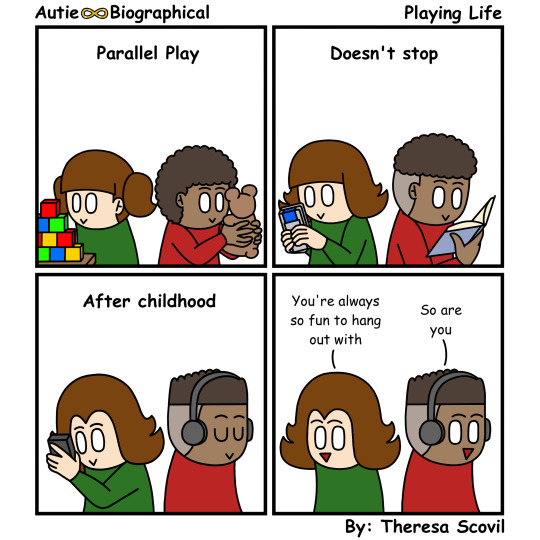
People so often talk about parallel play as a thing children do, but adults do it too! I love just hanging out with others while we do our own things. The fact that we're not doing something together doesn't bother me. It's simply being together that's important.
#autiebiographical#autie-biographical#actually autistic#autism#autistic#web comic#comic strip#comic#parallel play
3K notes
·
View notes
Text
I miss parallel play 😔
#i just wanna play my game while someone else is in the room also doing something they enjoy#i like hanging out and chatting and stuff#but i do miss parallel play :(#just being in someones presence while we do our own thing#the cons of living alone :/
1 note
·
View note
Text
quiet contentment
i would like to do this with you for years and years. sitting quietly in peace as you hem and haw underneath your breath as you draw. let's sit here for many years. i want to be with you.
#quietly sitting with my best friend at work#both of us parallel playing and doing our own thing with men i trust playing in the background#isn't there something inherently wonderful about sitting with someone you love and enjoying their company#it's like coming home after a long day and nothing needs to be said to understand the quiet contentment you feel toward one another#filed under: take your shoes off when you come into my house#typeface: my words#typeface: the blogger#for the stars
1 note
·
View note
Text
Amazon illegally interferes with an historic UK warehouse election

I'm in to TARTU, ESTONIA! Overcoming the Enshittocene (Monday, May 8, 6PM, Prima Vista Literary Festival keynote, University of Tartu Library, Struwe 1). AI, copyright and creative workers' labor rights (May 10, 8AM: Science Fiction Research Association talk, Institute of Foreign Languages and Cultures building, Lossi 3, lobby). A talk for hackers on seizing the means of computation (May 10, 3PM, University of Tartu Delta Centre, Narva 18, room 1037).

Amazon is very good at everything it does, including being very bad at the things it doesn't want to do. Take signing up for Prime: nothing could be simpler. The company has built a greased slide from Prime-curiosity to Prime-confirmed that is the envy of every UX designer.
But unsubscribing from Prime? That's a fucking nightmare. Somehow the company that can easily figure out how to sign up for a service is totally baffled when it comes to making it just as easy to leave. Now, there's two possibilities here: either Amazon's UX competence is a kind of erratic freak tide that sweeps in at unpredictable intervals and hits these unbelievable high-water marks, or the company just doesn't want to let you leave.
To investigate this question, let's consider a parallel: Black Flag's Roach Motel. This is an icon of American design, a little brown cardboard box that is saturated in irresistibly delicious (to cockroaches, at least) pheromones. These powerful scents make it admirably easy for all the roaches in your home to locate your Roach Motel and enter it.
But the interior of the Roach Motel is also coated in a sticky glue. Once roaches enter the motel, their legs and bodies brush up against this glue and become hopeless mired in it. A roach can't leave – not without tearing off its own legs.
It's possible that Black Flag made a mistake here. Maybe they wanted to make it just as easy for a roach to leave as it is to enter. If that seems improbable to you, well, you're right. We don't even have to speculate, we can just refer to Black Flag's slogan for Roach Motel: "Roaches check in, but they don't check out."
It's intentional, and we know that because they told us so.
Back to Amazon and Prime. Was it some oversight that cause the company make it so marvelously painless to sign up for Prime, but such a titanic pain in the ass to leave? Again, no speculation is required, because Amazon's executives exchanged a mountain of internal memos in which this is identified as a deliberate strategy, by which they deliberately chose to trick people into signing up for Prime and then hid the means of leaving Prime. Prime is a Roach Motel: users check in, but they don't check out:
https://pluralistic.net/2023/09/03/big-tech-cant-stop-telling-on-itself/
When it benefits Amazon, they are obsessive – "relentless" (Bezos's original for the company) – about user friendliness. They value ease of use so highly that they even patented "one click checkout" – the incredibly obvious idea that a company that stores your shipping address and credit card could let you buy something with a single click:
https://en.wikipedia.org/wiki/1-Click#Patent
But when it benefits Amazon to place obstacles in our way, they are even more relentless in inventing new forms of fuckery, spiteful little landmines they strew in our path. Just look at how Amazon deals with unionization efforts in its warehouses.
Amazon's relentless union-busting spans a wide diversity of tactics. On the one hand, they cook up media narratives to smear organizers, invoking racist dog-whistles to discredit workers who want a better deal:
https://www.theguardian.com/technology/2020/apr/02/amazon-chris-smalls-smart-articulate-leaked-memo
On the other hand, they collude with federal agencies to make workers afraid that their secret ballots will be visible to their bosses, exposing them to retaliation:
https://www.nbcnews.com/tech/tech-news/amazon-violated-labor-law-alabama-union-election-labor-official-finds-rcna1582
They hold Cultural Revolution-style forced indoctrination meetings where they illegally threaten workers with punishment for voting in favor of their union:
https://www.nytimes.com/2023/01/31/business/economy/amazon-union-staten-island-nlrb.html
And they fire Amazon tech workers who express solidarity with warehouse workers:
https://www.cbsnews.com/news/amazon-fires-tech-employees-workers-criticism-warehouse-climate-policies/
But all this is high-touch, labor-intensive fuckery. Amazon, as we know, loves automation, and so it automates much of its union-busting: for example, it created an employee chat app that refused to deliver any message containing words like "fairness" or "grievance":
https://pluralistic.net/2022/04/05/doubleplusrelentless/#quackspeak
Amazon also invents implausible corporate fictions that allow it to terminate entire sections of its workforce for trying to unionize, by maintaining the tormented pretense that these workers, who wear Amazon uniforms, drive Amazon trucks, deliver Amazon packages, and are tracked by Amazon down to the movements of their eyeballs, are, in fact, not Amazon employees:
https://www.wired.com/story/his-drivers-unionized-then-amazon-tried-to-terminate-his-contract/
These workers have plenty of cause to want to unionize. Amazon warehouses are sources of grueling torment. Take "megacycling," a ten-hour shift that runs from 1:20AM to 11:50AM that workers are plunged into without warning or the right to refuse. This isn't just a night shift – it's a night shift that makes it impossible to care for your children or maintain any kind of normal life.
Then there's Jeff Bezos's war on his workers' kidneys. Amazon warehouse workers and drivers notoriously have to pee in bottles, because they are monitored by algorithms that dock their pay for taking bathroom breaks. The road to Amazon's warehouse in Coventry, England is littered with sealed bottles of driver piss, defenestrated by drivers before they reach the depot inspection site.
There's so much piss on the side of the Coventry road that the prankster Oobah Butler was able to collect it, decant it into bottles, and market it on Amazon as an energy beverage called "Bitter Lemon Release Energy," where it briefly became Amazon's bestselling energy drink:
https://pluralistic.net/2023/10/20/release-energy/#the-bitterest-lemon
(Butler promises that he didn't actually ship any bottled piss to people who weren't in on the gag – but let's just pause here and note how weird it is that a guy who hates our kidneys as much as Jeff Bezos built and flies a penis-shaped rocket.)
Butler also secretly joined the surge of 1,000 workers that Amazon hired for the Coventry warehouse in advance of a union vote, with the hope of diluting the yes side of that vote and forestall the union. Amazon displayed more of its famously selective competence here, spotting Butler and firing him in short order, while totally failing to notice that he was marketing bottles of driver piss as a bitter lemon drink on Amazon's retail platform.
After a long fight, Amazon's Coventry workers are finally getting their union vote, thanks to the GMB union's hard fought battle at the Central Arbitration Committee:
https://www.foxglove.org.uk/2024/04/26/amazon-warehouse-workers-in-coventry-will-vote-on-trade-union-recognition/
And right on schedule, Amazon has once again discovered its incredible facility for ease-of-use. The company has blanketed its shop floor with radioactively illegal "one click to quit the union" QR codes. When a worker aims their phones at the code and clicks the link, the system auto-generates a letter resigning the worker from their union.
As noted, this is totally illegal. English law bans employers from "making an offer to an employee for the sole or main purpose of inducing workers not to be members of an independent trade union, take part in its activities, or make use of its services."
Now, legal or not, this may strike you as a benign intervention on Amazon's part. Why shouldn't it be easy for workers to choose how they are represented in their workplaces? But the one-click system is only half of Amazon's illegal union-busting: the other half is delivered by its managers, who have cornered workers on the shop floor and ordered them to quit their union, threatening them with workplace retaliation if they don't.
This is in addition to more forced "captive audience" meetings where workers are bombarded with lies about what life in an union shop is like.
Again, the contrast couldn't be more stark. If you want to quit a union, Amazon makes this as easy as joining Prime. But if you want to join a union, Amazon makes that even harder than quitting Prime. Amazon has the same attitude to its workers and its customers: they see us all as a resource to be extracted, and have no qualms about tricking or even intimidating us into doing what's best for Amazon, at the expense of our own interests.
The campaigning law-firm Foxglove is representing five of Amazon's Coventry workers. They're doing the lord's work:
https://www.foxglove.org.uk/2024/05/02/legal-challenge-to-amazon-uks-new-one-click-to-quit-the-union-tool/
All this highlights the increasing divergence between the UK and the US when it comes to labor rights. Under the Biden Administration, @NLRB General Counsel Jennifer Abruzzo has promulgated a rule that grants a union automatic recognition if the boss does anything to interfere with a union election:
https://pluralistic.net/2023/09/06/goons-ginks-and-company-finks/#if-blood-be-the-price-of-your-cursed-wealth
In other words, if Amazon tries these tactics in the USA now, their union will be immediately recognized. Abruzzo has installed an ultra-sensitive tilt-sensor in America's union elections, and if Bezos or his class allies so much as sneeze in the direction of their workers' democratic rights, they automatically lose.

If you'd like an essay-formatted version of this post to read or share, here's a link to it on pluralistic.net, my surveillance-free, ad-free, tracker-free blog:
https://pluralistic.net/2024/05/06/one-click-to-quit-the-union/#foxglove

Image: Isabela.Zanella (modified) https://commons.wikimedia.org/wiki/File:Ballot-box-2.jpg
CC BY-SA 4.0 https://creativecommons.org/licenses/by-sa/4.0/deed.en
#pluralistic#unions#coventry#amazon#union busting#qr codes#foxglove#one click to quit the union#labor#gwb
2K notes
·
View notes
Text
Kabru, impossible mutual understanding & unknowable objects
Despite his concerted and constant efforts to understand other people, it’s established in a few extras that Kabru believes that true mutual understanding between certain different races is impossible. Specifically, between long-lived and short-lived races, and between humans and demi-humans. Partially, we can trace this conviction back to specific hang-ups caused by his life; the trauma of the Utaya disaster, prejudices he carries from his childhood, and his experience of racism among the elves. In this “little” essay, I’m gonna discuss how I think those experiences formed this belief, how it comes out in his actions, and how some of his actions seem to contradict it. The question of whether it’s possible to reach mutual understanding with other living beings despite our differences is one of the core themes of the manga, and I’ll also touch on how this aspect of Kabru’s character links to that.
Seeking understanding
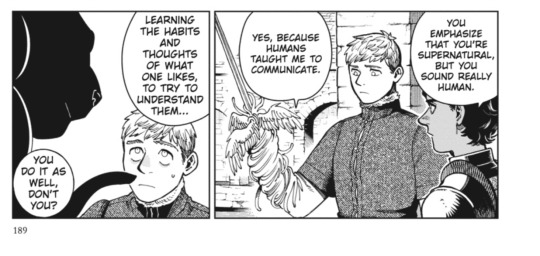
Kabru is a character who devotes a huge amount of time and effort to understanding people, and he is very good at it. In his internal monologue, we can tell how advanced and complex his skills of analysis are. He is able to read a huge amount of information just from looking at people's faces and body language.


People are, to him, what monsters are to Laios. This is something that's been expanded on at length in other, excellent meta. It's the fact that they're foils; it's the fact that Kabru is also very easy to read as autistic, with a special interest which is the opposite and parallel of Laios'. It's something that came out of trauma and alienation, as Laios' special interest in monsters also began as a coping mechanism.
The complicated origin of this "love" for monsters and for people comes through, I think, in the fact that one of the places we see both characters use their fixation is in being very, very good at killing the thing that they love. This also ties into the idea that loving something isn't even remotely mutually exclusive with using it to sustain your own survival; using it for your own purposes; hurting it or killing it. Love can be, and often is, violent, possessive and consumptive. This understanding is part of what makes Kui's depiction of interpersonal relationships so compelling to me.
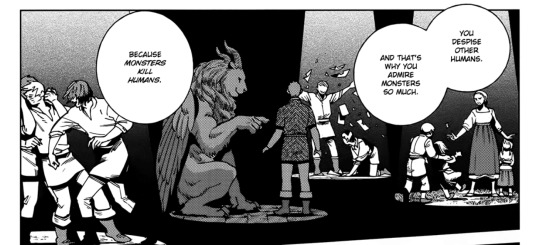
While Laios fixated on monsters and animals to seek a place of escape, in both his imagination and his self-image, from the humans who he couldn't understand and who couldn't understand him, Kabru seems to have fixated on understanding people in order to navigate the complex, socially marginal places that he has been forced into throughout his life. As an illegitimate child raised by a single mother with an appearance that marked him out as different to the point his father's family wanted to kill him, and a tallman child raised among elves who didn't treat him as fully human and wanted him to perform gratefulness for that treatment – treatment that, after he met Rin at age 9, he certainly always understood could be a lot worse – his ability to work out what people wanted from him, whether they were friendly or hostile or had ulterior motives, wasn’t just an interest. It will have been an essential skill.
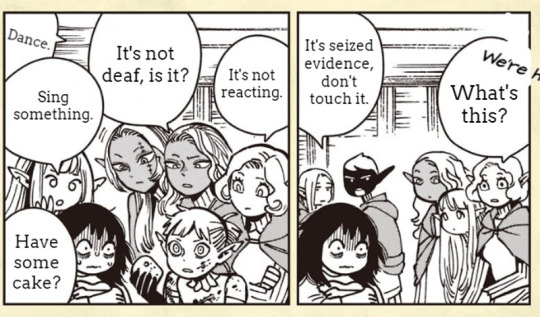
Milsiril, I think, was a flawed parent who tried to do her best by Kabru and did a lot of harm to him despite her best intentions. She may have treated him much better than an average elf would have, but like Otta and Marcille's mother, there are other elves with different outlooks on short-lived races. How would they judge her treatment of him? We don’t have any insight on what it could be, but to be honest, the person’s whose opinion of her I’d be most interested in knowing is Rin’s.
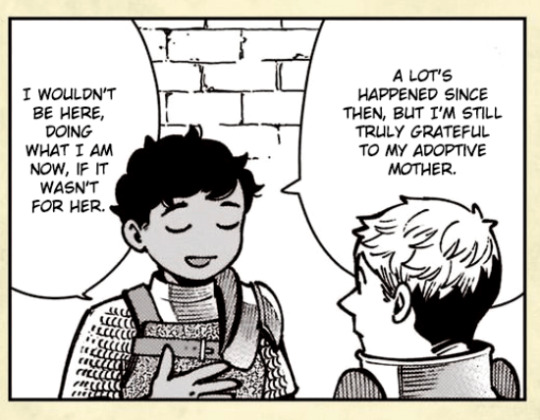
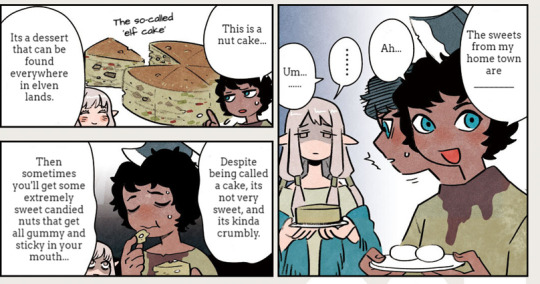
But even if she'd been perfect, living as an trans-racial adoptee in a deeply hierarchical nation with a queen who is a 'staunch traditionalist' who wouldn't even acknowledge the existence of a half-elf like Marcille (according to Cithis) is an experience that would deeply impact anyone.
Elves & Impossible mutual understanding
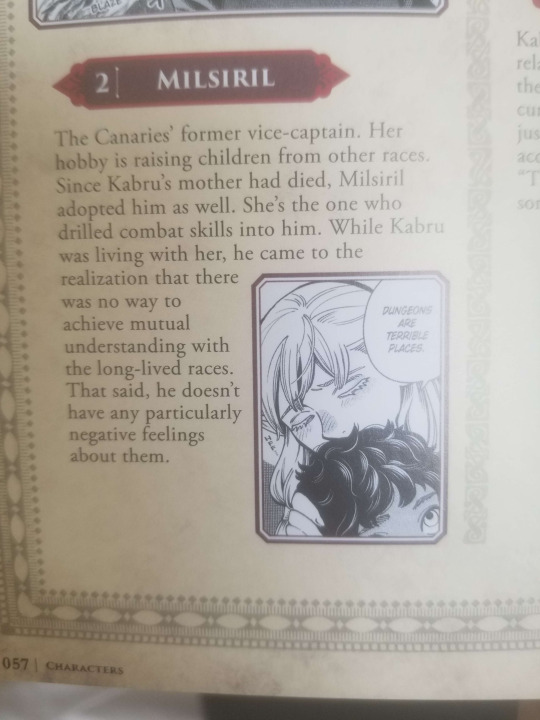
While Kabru was living with Milsiril - in other words, while living in the Northern Central Continent - he came to believe that "there was no way to achieve mutual understanding with the long-lived races."
This is evident in his political project: he wants short-lived races to have ownership over the dungeon's secrets. Despite his dislike of the Lord of the Island, he's a useful bulwark to stop the elves taking over. Despite his doubts about Laios, Laios needs to be the one to defeat the dungeon, because if he doesn't the elves will take over.
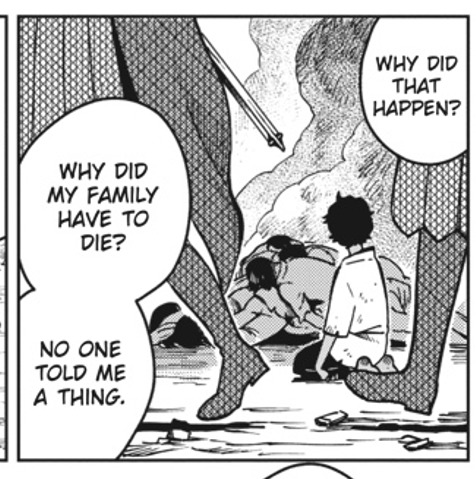
Kabru still carries a deep scar from Utaya, one that was exacerbated by the fact that he never got an answer to any of his questions about what happened or why. This, despite the fact that Milsiril knows about the demon and how it works. Do you think Kabru, with his social perceptiveness that borders on the superhuman, wasn't aware that she knew more than she would tell him?
Given that, the fact that he gets to a place where he "doesn't have any particularly negative feelings about [elves/long-lived species]" .... well, to put it bluntly, I believe that he thinks that's the case, but I kind of doubt it. After all, if he did have resentment, of Milsiril (someone who was his primary provider and caretaker since age six, and who despite her flaws, loves him and who I do think he loves) or of elves (who he has had to play nice with for most of his life, in order to survive, and will still have to play nice with in order to achieve his goals, since they hold all the power) what would that do except hurt him and make his life harder? Kabru is Mr. Pragmatic, so I don't think he'd let himself acknowledge any such feelings he did have. Exactly because he can't acknowledge them, they're well placed to get internalised as beliefs about the Fundamental Unchangeable Nature of the World.
However, these stated beliefs seem to contradict his actions. Despite his belief in the impossibility of forming a mutual understanding, he certainly seems to try to understand long-lived people, just as much as he does short-lived people. There's no noticeable difference between his treatment of Daya & Holm versus Mickbell & Rin that isn't clearly down to their relationship with him. His skills of human analysis were honed and developed while living amongst elves, and as soon as he's alone with Mithrun he immediately sets to understanding him - his interests, his motivations, his needs, and his past.
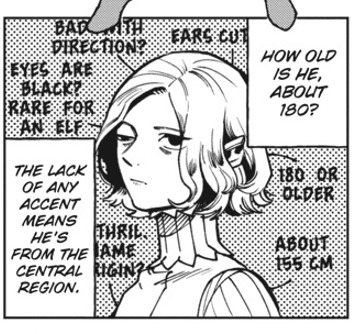
He treats him considerately and without bias, and despite the fact that Mithrun conquering the dungeon for the elves is both a reenactment of a core part of his childhood trauma and a political disaster for his aims, that doesn't seem to colour his perspective on Mithrun negatively at all.
This is something I find extremely laudable about Kabru, and it's another way he parallels Laios. He seems to understand that people, as a rule, (in Laios' case, he understands this about monsters - and eventually, all living beings) will act in their own interests, and if those interests conflict with yours, might harm you. But that's just their nature, and it's not something that should be held against them; you're also doing the same thing, after all. The crux of Laios' arc is precisely that he has to accept the responsibility of hurting someone else in order to achieve what he wants.
Kabru is deeply concerned with his own morals, what he should and shouldn't do, but mostly in the context of responsibility for the consequences - a responsibility he takes onto himself. He isn't scrupulous about what he needs to do in order to create the outcome he wants, but if he fails to create that outcome, then....
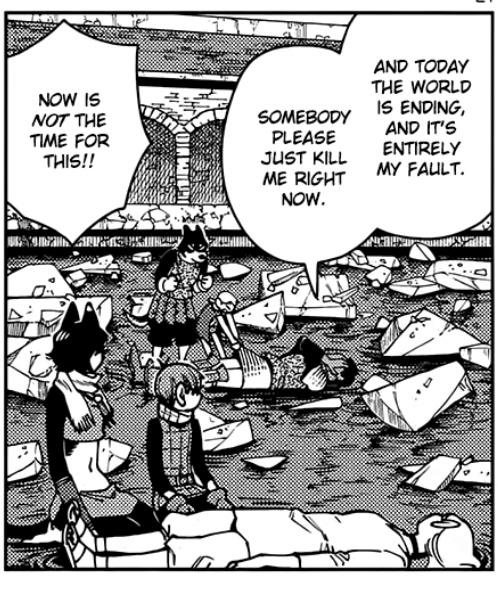
He blames himself to the point of thinking he should die. He doesn't blame Laios, or seem at all angry with him, despite concluding he should have killed him to prevent this outcome. That's because in his eyes, ultimately Laios was going to act according to his own nature, and it's Kabru's fault for not understanding that nature well enough. He's extremely confident in his ability to understand and predict others, (including elves and other long-lived people). Then, where does his conviction that mutual understanding is impossible come from?
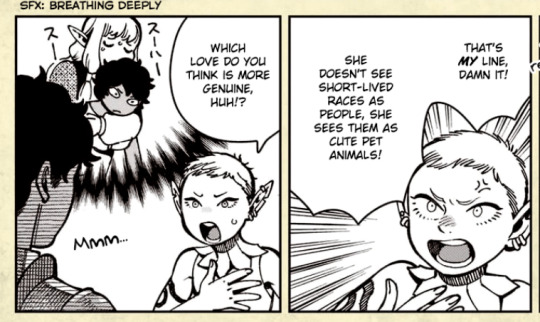
Partially, it's the "mutual" part. I'm sure Kabru, who isn't able or willing to deny Otta's insinuation that Milsiril saw him more like a pet than a son, has felt that his full interiority, the depth of his feelings and his ability to grow, act, and think as a fully equal being, was something that the elves around him just couldn't grasp. Because that was their excuse for it, he came to understand this as a gulf between short-lived and long-lived beings, an inevitable difference in outlook caused by their different lifespans.
This experience might be part of what leads to his iconic “fake” behaviour. He trusts his ability to understand others, but if they aren’t able to understand him, then there isn’t any benefit to being honest about his feelings and thoughts. If his attempts to reach mutual understanding with his caretakers were never able to be fulfilled, then it isn’t any wonder that he reacts with such surprise and horror at blurting out his desire to be Laios’ friend.
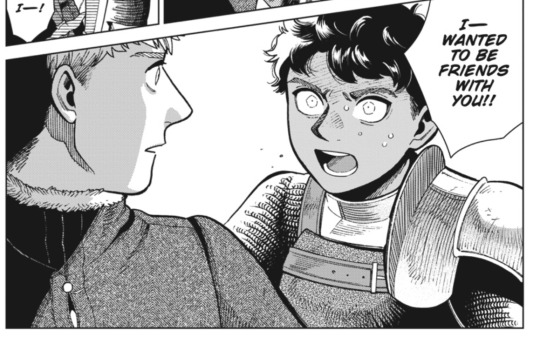
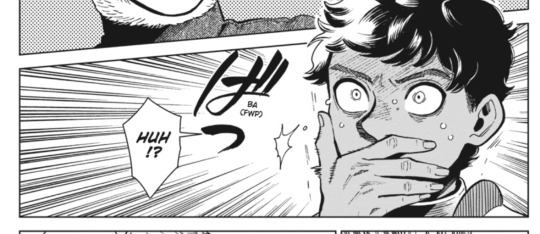
In his experience, making yourself vulnerable in that way only leads to being hurt. Soothing him, hushing him, lying to him, talking to him like a child that isn’t able to use proper judgement – that’s an inadequate and deeply hurtful way to respond to genuine distress, the desire for autonomy, or disagreement. Ultimately, I think that’s why he comes out on the side of being grateful to Milsiril; because she did equip him with the skills and knowledge he’d need to reach his goal, and let him go.
Though he could understand them, they couldn't understand him. To the extent that was true - which I'm sure it was - it wasn't due to anything about lifespan. It was due to the elves’ racism, and the solipsitic mindset & prejudiced attitude that it caused them to approach him with.
Because, if it needs to be said, the idea that there is an unbreachable gap in understanding between the long-lived and short-lived species is not true. Marcille and Laios have a much greater difference in lifespan than any full elf from any short-lived person, and they’re able to understand each other – maybe not perfectly, but better than many other people who are closer in life-span to them.
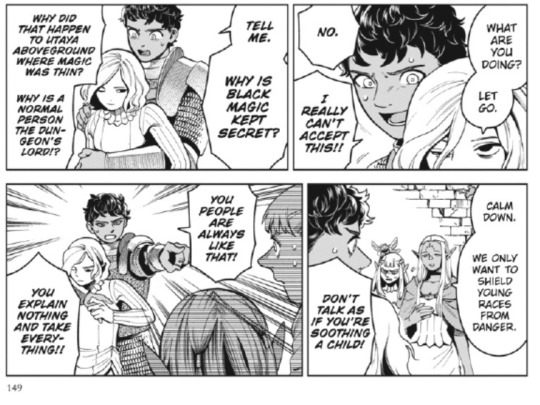
That doesn’t mean that I think Kabru is wrong about this, however. Because there’s an interpretation of his statement that is reflected in his actions and is true. When he talks about his problem with elves, it’s not just their attitudes: it’s their power, and what they use it to do. They “explain nothing and take everything”. Though it’s presented in the guise of ‘guiding and protecting’, in fact it’s a simple case of a powerful nation using their military power, wealth, access to resources, and historically stolen land – including the island itself – to protect their own interests and advance their own agenda. That’s why they’d be able to show up, seize the dungeon, and forcibly take Kabru’s party and Laios’ party to the West. If Kabru wants to stop that from happening, or change that status quo, persuasion or a bid to be understood would be completely pointless. Between the political blocs formed by long-lived species and the interests of short-lived species, ���mutual understanding”, given their current, unequal terms, would be impossible. This is something that we see reflected in Kabru’s actions; before he asks his questions about the dungeon, he grabs Mithrun as leverage. He never really attempts to persuade the canaries to see his point of view, because that would be pointless: they’re agents of the Northern Central Continent’s monarchy, and will act in its interests regardless of any individual relationship with him.
I don’t think Kabru sees the different dimensions of this belief of his in quite such clear terms, however, as is evidenced by the other group who he thinks it’s impossible to communicate with.
Demi-Humans & Unknowable Objects
The other place that we see his conviction about the impossibility of mutual understanding is in the kobold extra.
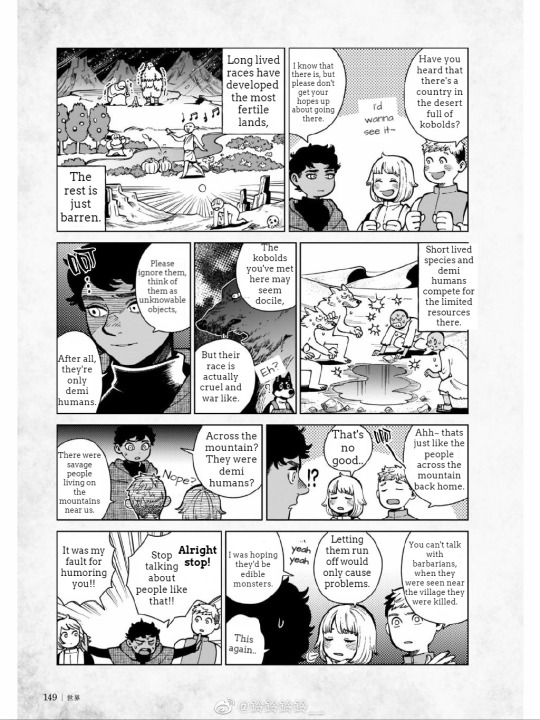
I'm including the whole thing, because I think it's an excellent and clever piece of world-building. Aside from what it says about Kabru, which I'll expand on shortly, what this extra does is deconstruct and call into question the usual "fantasy ontological biology" present in these sort of DnD-like settings. Essentially, the kind of worldbuilding where a race (such as kobolds) can be described as war-like, and that's establishing something essential about their biological nature. That's common to the point that if Kui didn't include this, some people would probably come away thinking that's the case about, e.g., the orcs.
But here, despite what Kabru is saying, the information the reader actually gets is:
the conflict between short-lived humans and demi-humans such as kobolds is mostly over access to material resources that they need to survive.
These resources are scarce because powerful nations, such as the elves, have monopolised them.
Kabru, who has grown up in a place at the centre of these conflicts, ascribes essential, negative traits to a cultural group which was in direct conflict with his own. Communication with this other group is impossible; they aren't people, they're more like objects.
oh yes! just like this conflict between groups of tall-men, a conflict which the reader will immediately interpret as more clearly analogous to real-life racism. Our other protagonists also carry prejudices from growing up in a place where a marginalised group was in conflict with the dominant group over scarce resources. It's definitely impossible to communicate with these people, and you can only kill them.
Woah, when you say it like that, it sounds pretty bad!
But also, nobody walks away having had a realisation or unlearned their prejudices - because they don't have the tools they need to do that work. Yet. I do think, to an extent, it could happen - especially with Kabru, since it's suggested in the epilogue that Melini might become a safe-haven for demi-humans.

To focus in on Kabru, the key here is his statement that you should think of demi-humans as "unknowable objects". Even his extraordinary powers of understanding have seemingly hit a limit. Part of this is just inherited prejudice, and doesn't need to have a complicated psychological explanation, any more than the elves who were prejudiced against him need one.
But also... this is probably somewhat linked to the way demi-humans seem to be considered "pseudo-monsters". They're the place that the strict delineation between the human and the monstrous is permeated. Laios, who is not interested in humans, remembers and is excited by Kuro. Chilchuck and Laios argue over whether it's OK to eat a mermaid. Kabru's prepared to (pretend to) roll with the idea that Laios ate the orcs.
But these are people, aren't they? Of course, this is a social construction, as we see from the fact that in the Eastern Archipelago, the label of "human" is reserved for tallmen, but in most of the rest of the world it depends on some obviously arbirary classification based on number of bones; "demi-humans" aren't in any essential way monstrous, except to an extent in their appearance, and physical location - due to their marginal social status, they're pushed out to live in unsafe places such as dungeons.
Therefore, Kabru's view of demi-humans as fundamentally "other", unable to be understood - monstrous - could be read as akin to abjection, the psychoanalytical concept described by Julia Kristeva. In order to create a bounded, secure superego, that thing which permeates and calls into question the border between self and other, human and animal, life and death, is rejected and pushed to the margin.
“Not me. Not that. But not nothing, either. A "something" that I do not recognize as a thing.[...] On the edge of nonexistence and hallucination, of a reality that, if I acknowledge it, annihilates me. There, abject and abjection are my safeguards. The primers of my culture.” (Kristeva et al., 1984, p. 11) “It is thus not lack of cleanliness or health that causes abjection but what disturbs identity, system, order. ” (Kristeva et al., 1984, p. 13) “The pure will be that which conforms to an established taxonomy; the impure, that which unsettles it, establishes intermixture and disorder. [...] the impure will be those that do not confine themselves to one element but point to admixture and confusion.” (Kristeva et al., 1984, p. 107) (discussing food prohibitions in Leviticus)
This is both (due to its affinity with food-loathing and disgust) a very fruitful concept to apply to dunmeshi, and a psychoanalytical theory which I wouldn't exactly cosign as True Facts About Human Psychological Development. You may also know the abject from its utilisation in the classic essay "Horror and the Monstrous-Feminine" by Barbara Creed - that's a lot more approachable than Kristeva if anyone's interested.
Key here, though, is that through the symbol of the "demi-human" is embodied a step between "human" and "monster" - and that's a prospect that puts at risk the whole notion of an absolute separation between those two categories in the first place. To Laios, that's something wonderful, and to Kabru, it's terrifying. We can see this principle further embodied in the relationship both characters have with the notion of becoming monstrous.
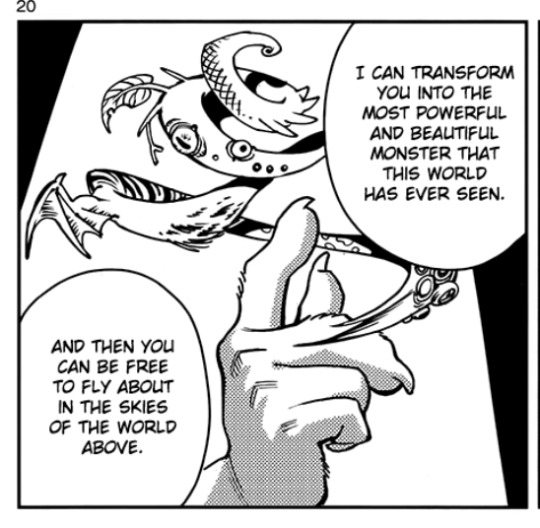
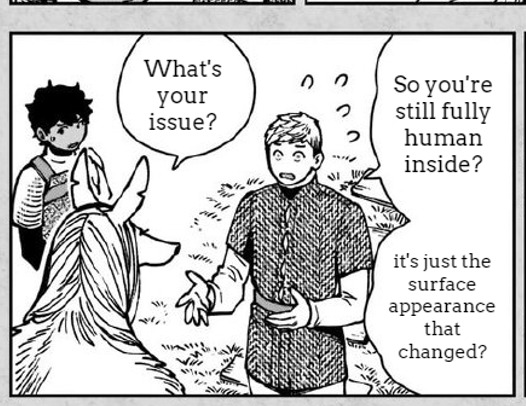
To Laios, this is transcendent, and represents a renunciation of everything human - in fact, if it didn't, it wouldn't "count".
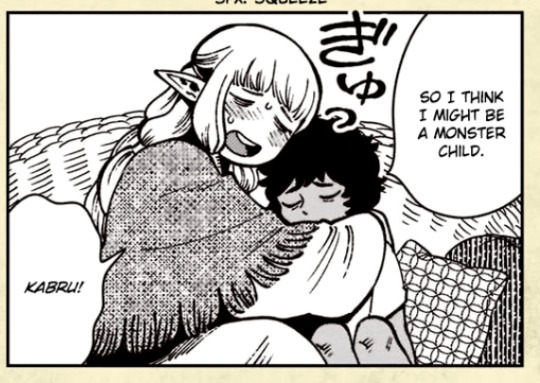
To Kabru, it's a deeply-held fear, established by his childhood alienation (due to his illegitimacy, his eyes, and perhaps also his neurodivergency), deepened by monster-related trauma and the sense of responsibility and survivors guilt he feels for what happened at Utaya. His identity as a human who is not monstrous is key to his sense of stability and safety; he doesn't want to touch monsters, he doesn't even want to see them.
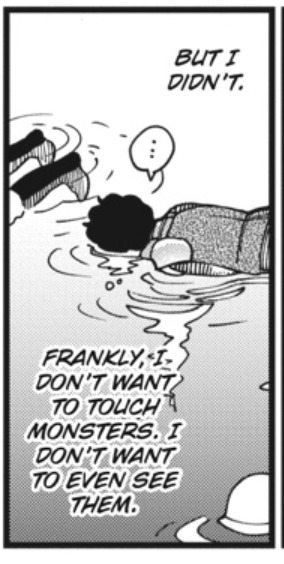
To acknowledge a kinship, a possibility of similarity between the things he loves (humans) and the things he hates (monsters) would be more than touching them - it would be putting them inside him. We know, quite explicitly, that this notion is triggering to Kabru. He literally has what seems to be a flashback when he's about to eat the harpy omelette.
So he abjects it, classifying the demi-human as fundamentally unlike him - an unknowable object, or an object that he refuses to know. Because in understanding it, he would interject the things he hates and fears into his self, which is already, always under threat by that hated and feared object.
Of course, again, Kabru isn't very good at enacting this refusal in practice. For one, when he chooses between his desires and ingesting the feared object, eating monsters... he eats monsters. Part of this is treating himself badly, the "ends justify the means" mentality. His goal is to destroy all monsters, so if he needs to become monster-like to do that, he will. But part of it is also the other motivation that he didn't even seem to know about until he said it: he wants to become Laios' friend, and to learn from him how a person can like monsters. He wants, at least in some part of him, to reconcile the feared and hated object into something he can understand.
For another:
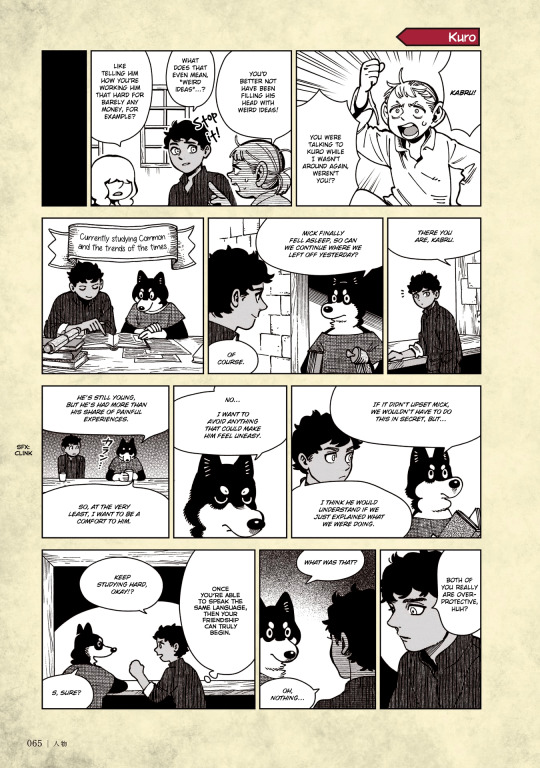
Kabru can speak the kobold language. In the first place, while this may have been common in Utaya, it also could have been something he chose to learn, an early expression of his interest in understanding and talking to all sorts of people. It isn't the kind of thing you learn if you believe that communication between yourself and the group that speak it is impossible, is it?
It's possible to harbour prejudices against a group while being kind to an individual, and given Kabru has those prejudices regardless of his reasons, that is what he is doing. But also, his treatment of Kuro doesn't reflect a sincerely held belief that he's an "unknowable object" at all. His approach is exactly the same as it is to any other person: an analysis of goal and motive, and an attempt to help if he's sympathetic and their goals align - going out of his way to give language and local knowledge lessons in secret. His conviction that Mickbell and Kuro will truly become friends when they can properly communicate is completely contradictory to any sense of demi-humans as fundamentally different, or impossible to reach mutual understanding with. To me, it seems like this self-protective shield against the corruptive force demi-humans as an idea present to his identity, this abjection, when Kabru is face-to-face with one, just simply can't hold up against his finely honed skill of intellectual empathy. Perhaps because he's autistic, it seems his "empathy" is less an emotional mirror response, and more a set of cognitive skills for analysis of others. That instinctual, emotional empathy might not trigger when presented with a member of an out-group, but if it’s possible for Kabru to turn his cognitive empathy off, we don’t see him do it.
This isn't to say that this prejudice doesn't affect his behaviour. For one, it could negatively impact his judgement of politics and policy, where individual people don't enter into it. For another, I'm not convinced he'd be willing to overlook Mickbell's exploitative relationship with Kuro if Kuro wasn't a kobold. As it is, since both of them are satisfied, he doesn't feel like he needs to intervene, regardless of the fact Mickbell isn't paying Kuro. But if Daya and Holm were in a relationship, and Holm took both Daya's and his own share from their ventures, but only compensated her in living expenses and kept the rest, do you think he'd tolerate it, for example? Even if she said it was OK?
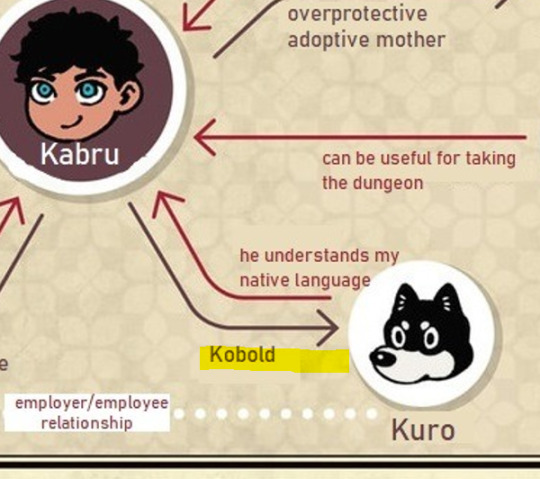
Conclusion

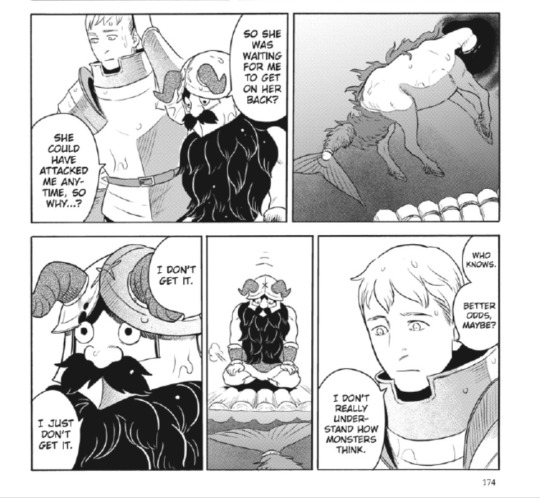
The kelpie chapter establishes that "people can never know what monsters are really thinking." That isn't just true of monsters, though.
True mutual understanding is impossible - between anyone. We can never truly understand another person's heart. This is touched on in, for example, the existence of shapeshifters and dopplegangers. Even a monster that seemed like a perfect copy of a person wouldn’t be that person, and wouldn’t be a satisfactory replacement.
We’re intended, I think, to understand the winged lion's repeated suggestions to just replace people who have been lost with copies as something uncanny, which demonstrates the way that the winged lion never manages to attain a complete understanding of humans. A version of a person who was created to fulfil your memories of them, to be the person who you wanted them to be, would be a terrible, miserable thing.
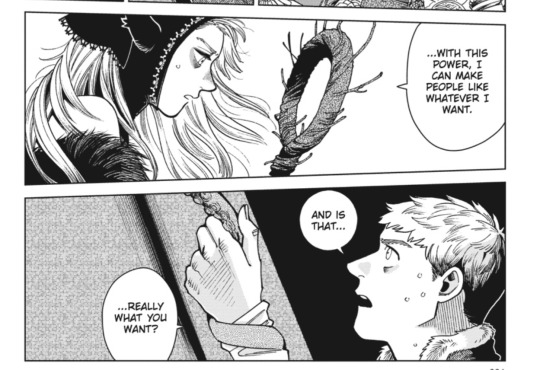
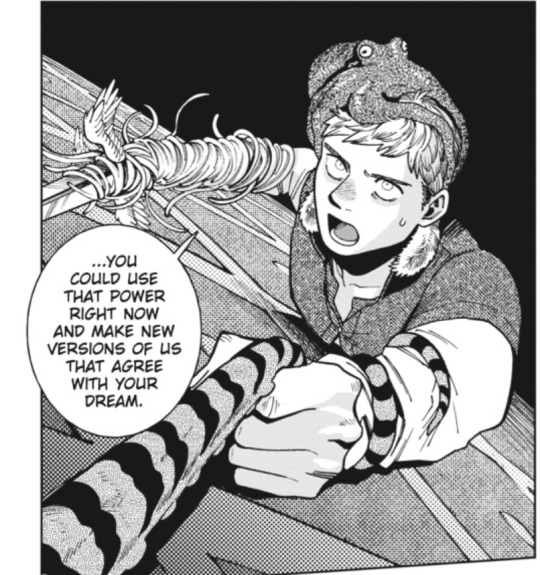

Disagreeing, coming into conflict, and misunderstanding each other, are essential parts of what it means to be living beings, as fundamental as the need to eat.
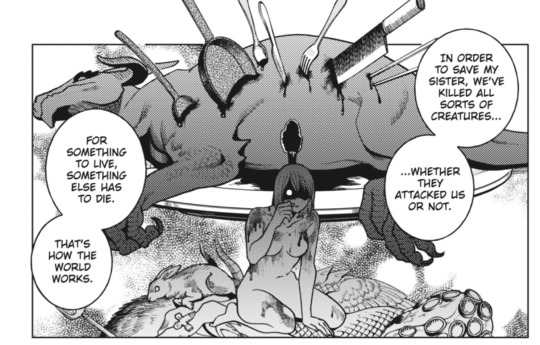
The only thing to do is not to take more than you need to eat to survive, and not impose your own desires onto others. To do your best to sincerely communicate your desires, even if they're embarrassing or vulnerable or strange, like Kabru eventually does with Laios; like Laios does, bit by bit, with the people around him; like Marcille does, Chilchuck does, Senshi does... to hope they will accept you, and do your best to understand them in return.
We can re-examine, in that context, Kabru's line about the elves' tendency to "explain nothing and take everything".
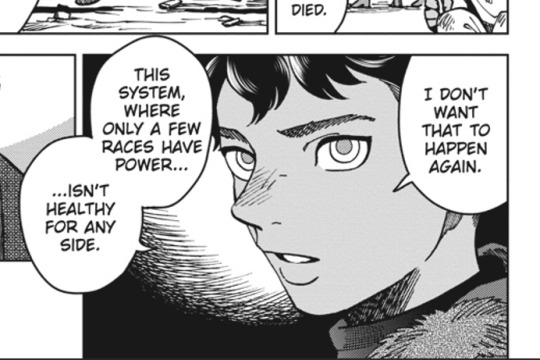
They have the power to impose their preferred "menu" onto less powerful groups. And in that context, mutual understanding being impossible just means that they won't give up their power because they're asked nicely. Kabru's goal is to seize the truth that they won't give to him, and to create a situation where they can't take everything. Because he's accurately surmised that nothing about the treatment of short-lived races will change so long as the power imbalance remains. Despite the way he mistakenly ascribes part of that to "long-lived vs short-lived" or "human vs demi-human", the actual gulfs in understanding he identifies are structural, are about power and about access to material resources and safety.
I think he could come to recognise this. Yaad is teaching him political science after all, and while a prince's lessons on political science won't exactly get at much that's radical or invested in the interests and perspectives of the marginalised (Capital is a critique of for a reason after all...) I believe in Kabru's ability to learn critically and get more from a lesson than it was intended to teach.
#og post#kabru of utaya#kabru dungeon meshi#laios touden#dungeon meshi meta#dungeon meshi#dunmeshi#dungeon meshi manga spoilers#dungeon meshi analysis#kuro dungeon meshi#the canaries#milsiril#continuing to develop my kabru theses.#literally sitting and thinking about kabru all day. rotating him.#he's in the microwave. to me.
2K notes
·
View notes
Text
vi x reader, parallel universe!vi x reader | character death (reader)
ekko paints a picture of you.
"I wanted to show you something," Ekko tells Vi before he's leading her and Powder to where he's made his masterpiece. He doesn't know how Vi will react; if she'll be overcome with joy or overwhelmed with immense sadness.
Maybe she'll get angry and storm off, too hurt by the painting to truly express how she feels. But Ekko feels like doing this is worth that risk because hopefully, in a way, it will provide Vi with some closure.
When they reach the mural, Ekko stops and watches Vi and Powder take the remaining steps forward. He takes in how Powder's face lights up before she's pursing her lips with a slight tremble. He can tell that she's trying not to cry, and Ekko wants to pull her into his embrace and tell her that it's okay to let it out.
Vi's harder to read.
She's staring up at the mural, expressionless, and Ekko worries that he may have crossed a line. Vi's silence is deafening; it shakes him to his core, and he almost steps forward to apologise when Vi asks:
"Is this...them?"
Ekko swallows and nods as he replies, "Yes." He walks up until he's by Vi's side. "I took some artistic liberation and...imagined what they would have looked like if they hadn't..." Ekko stops himself, finding the words still too hard to say.
Vi stares and stares until she's closing her eyes, letting out a trembling breath.
"They're even more beautiful than I imagined," she whispers, barely loud enough for him to hear. Powder hears it too because she's smiling, sniffling as she wipes at her eyes.
"Yeah, a real looker," she says. "They were cute when they were younger, so it's no surprise that Ekko made them a bombshell." She looks at Ekko, a teasing glint in her eyes. "Should I be worried? Did you hold a candle for our dear friend here?"
Ekko chuckles and shakes his head. He's never held feelings of that sort for you. Yes, he did think you were pretty when he was growing up, but it never escalated beyond that. Besides, everyone knew that it was Vi you were going to end up with. Because it was you and Vi and Vi and you, and it was so obvious, the love you held for each other.
Still is obvious back in his own universe, but...he wishes he could have seen you thrive here. Happy and alive with no reason to run or hide. To be at peace with the people you love and who love you.
"They were everything to me," Vi says after a moment of silence. "They were my world in a way that was different from you guys." She gives a rueful chuckle. "Barely grown up, and we were already talking about getting married. We knew we wanted to be each other's for the rest of our lives." She then sighs. "Then that damn explosion happened, and they protected me. Made sure I survived, and I still...still deal with the guilt."
The silence settles among them again, but it only lasts for a second as Vi breaks it.
"But I know they wanted me to be here for Powder," she continues softly. "And know they'd be cursing me to the ground if they knew my thoughts." Her lips curve into a gentle smile. "But at least, I can look at her now and see her a bit more vividly in my dreams." She looks at Ekko, smile still in place. "Thanks, Little Man."
Ekko nods, unable to speak due to the tightness in his throat. If only...if only he could tell Vi that there's a universe where you did survive. A universe that isn't as great as this, but you're together and manage to find happiness despite all the shit thrown at you.
If only he could tell Vi that's what you really look like. That's how you've grown and how you've transformed.
If only.
But at least he can take solace in the fact that he's graced Vi with some form of closure.
In the form of a picture of you.
850 notes
·
View notes